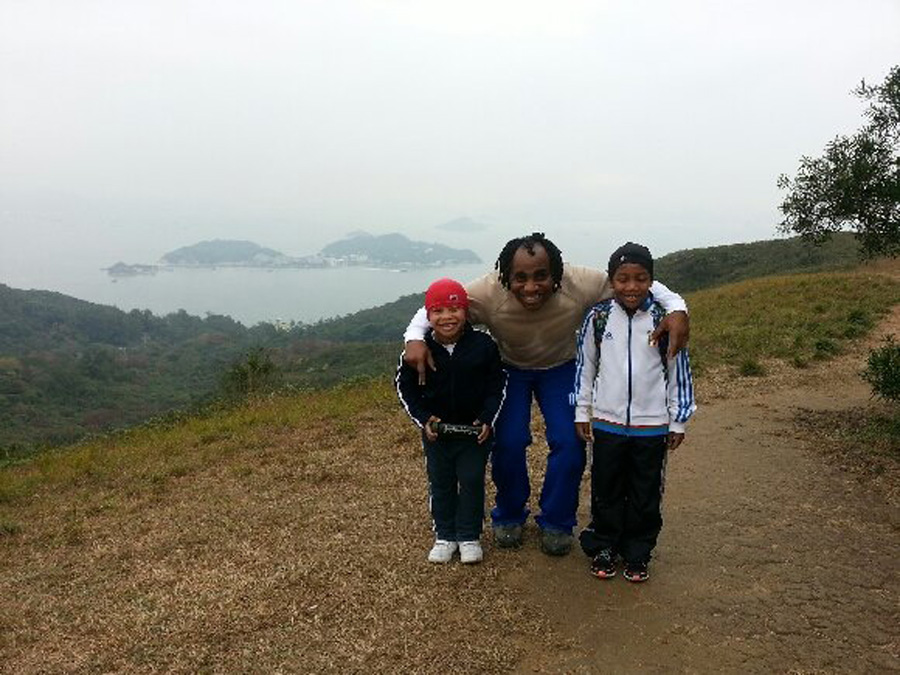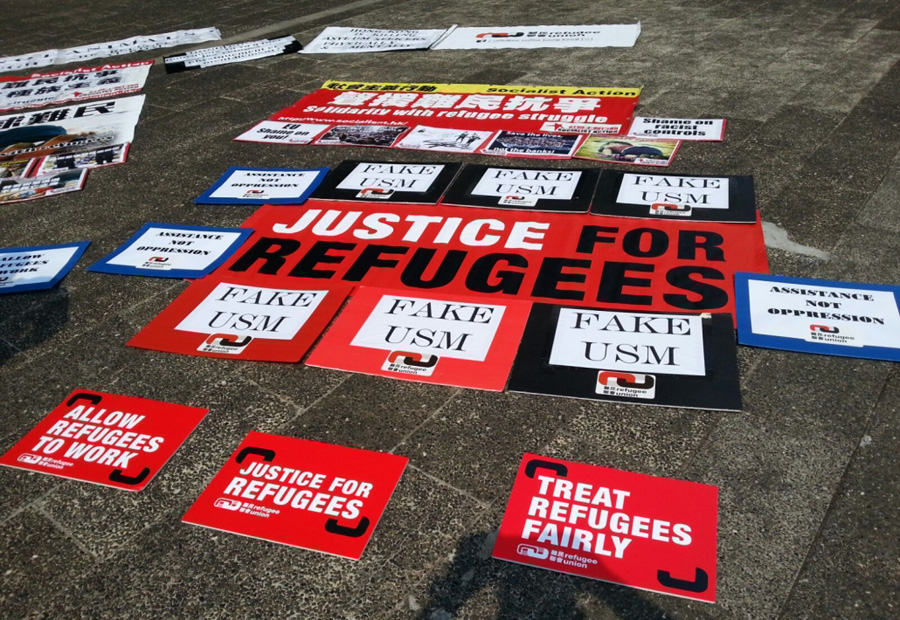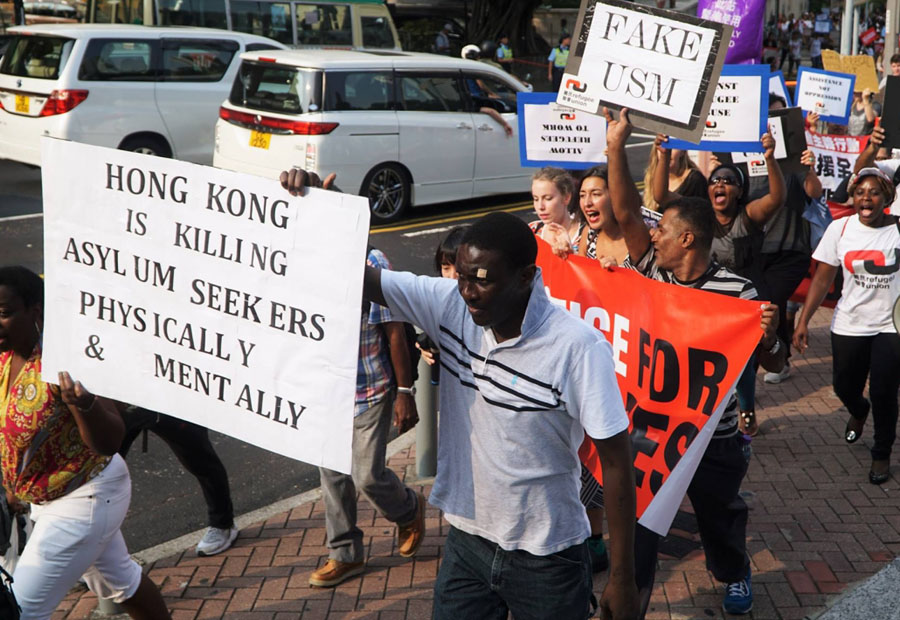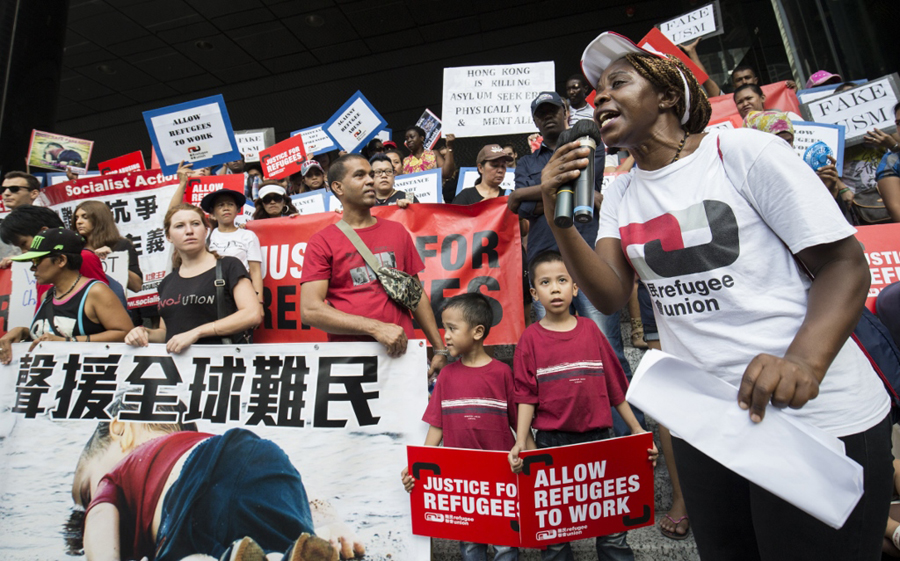Late last year, a Syrian refugee made his way to Hong Kong after walking 7,000 kilometres to escape the country’s civil war. He filed for asylum, and Hong Kong’s Immigration Department has confirmed that his case is pending.
However, if successful, he, like so many other asylum seekers, will be fighting a different kind of battle once recognised as a refugee in Hong Kong.
When Hong Kong’s highest court upheld a law that prevented refugees from working or even volunteering in 2014, those that came here in hope of salvation found themselves adrift.
Kaze Aurelyen, 42, migrated to Hong Kong from Cameroon in 2006, having already lost one fight for equality. He was an ambitious university student whose action of standing up for his inalienable rights resulted in him fleeing for his life.

Kaze Aurelyen and his children in Hong Kong. Photo: Coconuts Hong Kong
When Aurelyen protested a newly implemented government policy that required Cameroonian students to pay unforeseen university fees back in 2005, he, along with many others, organised what were meant to be peaceful protests in the capital of Buea. The demonstrations ultimately turned violent, resulting in several deaths.
“My father, brother and sister were killed by the Cameroonian government for protesting. Many people kept quiet,” Aurelyen said. “I was captured, but I was let go near the Nigerian border by one of the soldiers who told me I had to pretend I was killed, with the promise that I would not return.”
When Aurelyen arrived in Nigeria, he earned enough money to travel to Burkina Faso. “I was too afraid to live in and stay in Nigeria,” he said. “It was much cheaper to leave from Burkina Faso.”
Aurelyen later met a businessman who helped him migrate to Hong Kong. “He took pity on me and had done business in Hong Kong,” Aurelyen said. “He said it was a safe place to be.”
When Aurelyen arrived in Hong Kong, he, indeed, thought he had finally found a home. However, in his 11-year stay, he has never been legally employed.
Aurelyen, along with Hong Kong’s other estimated 11,000 refugees, has to rely on minimal government assistance for basic subsistence. Hong Kong’s refugees currently receive a housing allowance of HKD1,500, along with HKD1,200 for food and HKD230 for transportation per month.
“Asylum seekers and illegal immigrants are treated the same under the law,” complained Aurelyen.

Refugee protest signs in September 2015 at the Europeon Office building. Photo: Vision First
Peter Maina – who migrated to Hong Kong from Kenya two years ago and is a spokesman for the Refugee Union in Hong Kong – agreed that little distinction is made between refugees and illegal immigrants in Hong Kong, adding that the “no work” law perpetuates this thinking.
“The government spends HKD640 million per year on asylum seekers. The government wouldn’t have to spend so much money if they would let us work. We are referred to as illegals, not refugees,” he said.
Gabriel Temide, 27, who fled his home in the Ivory Coast 11 years ago because of conflict between Muslims and Christians that led to civil war, says obtaining casual illegal work in Hong Kong is not worth the risk.
“I cannot go back to my home country, it’s too dangerous,” he said. “[In terms of protection] life is better in Hong Kong, but of course I want to work. If I am caught working, I go to jail for 15 months.”
Mark Daly, a human rights lawyer who works with asylum seekers in Hong Kong, explained the reasoning behind the rules. “The floods of people arriving is what the government fears,” he said.
Hong Kong’s Secretary for Security issued a statement saying:
“Secretary for Security has stressed that it is a proven fact that the prospect of gainful employment attracts a severe influx of illegal immigrants.”
The department did not reply to Coconuts HK’s request for further comment.

Asylum seekers protest at the Europeon Union in September 2015. Photo: Vision First
When asked what other choices are left for refugees, Daly said, “Another option could be [for the government] to resettle them or for them [refugees] to marry a local.”
Aurelyen now has a wife in Hong Kong, but as fate will have it, she is also an asylum seeker from Indonesia. Their three children therefore also carry the same status, so will be prevented from working, volunteering, and receiving full medical benefits into adulthood.
A new generation of the hopeless.
Aurelyen, Temide and Maina, however, have all faced much bigger challenges in their native countries, and despite the persistent dissuasion of the Hong Kong government, none plan on quitting their pursuit for equality in the territory.
“I will continue to march and protest, I don’t know what the future will hold,” said Aurelyen.
“We can continue to engage the media, students and outreach groups. Young people in Hong Kong have an open mind,” said Maina. “We must continue to reach them.”



